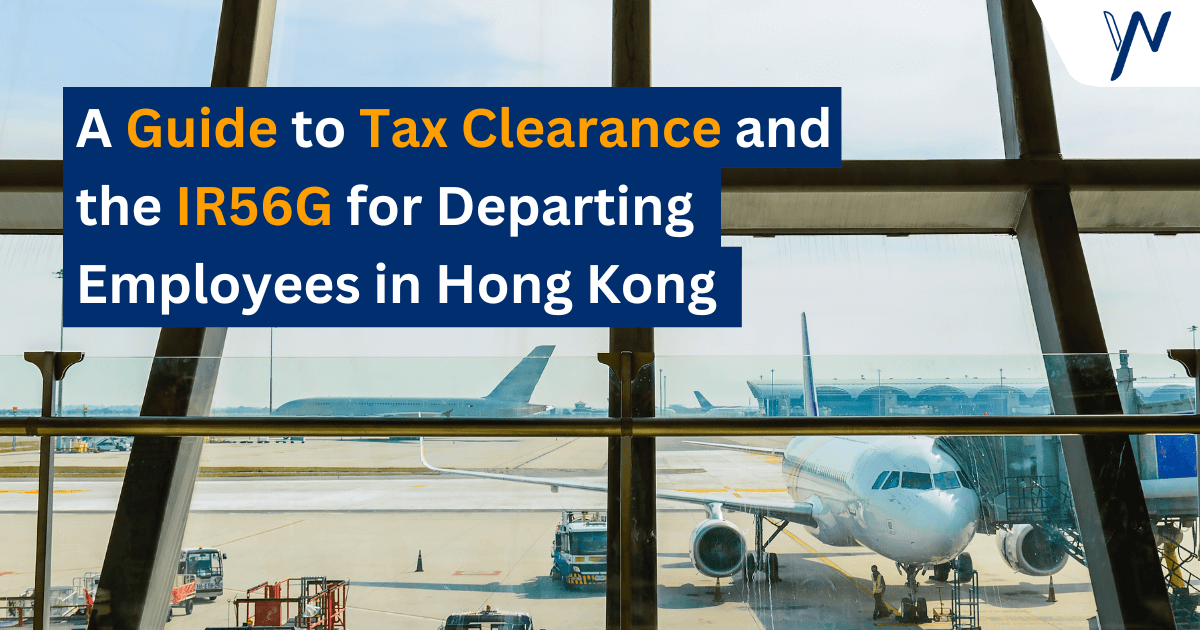清稅流程是怎樣的?
當您向僱主提出離職時,就會開始清稅流程。此時,法律要求您的僱主扣留所有應付款項,直到清稅完成。您或您的僱主將需要執行以下步驟:
- 您的僱主需要在您出發日期前至少一個月向稅務局(IRD) 提交 IR56G 表格。 [什麼是IR56G]。同時,您需要透過電話、電子郵件或郵寄方式通知 IRD 您的預計出發日期。這將觸發清稅流程。
- IR56G 表格需要準備兩份,第一份副本將由僱主向 IRD 提交,第二份副本自己保管。
- 向 IRD 提交文件時,請同時出示您的離職通知和最終支付報酬的通知。
- IRD 將向您郵寄一份名為「個人報稅表」或「BIR60」的綠色報稅表。該表格需要在簽發後 14 天內向 IRD 提交。
- 提交 BIR60 後,IRD 將向您發送最終的待結算稅單。您可以直接或透過香港政府的電子稅務網站或應用程式在線結算帳單。
- 一旦您結清了所有未繳稅款,請將您的收據提交給稅務局,稅務局隨後將向您發出一份「同意釋款書」,並出示給您的雇主。如果您無法親自領取,釋放信將直接發送給您的雇主。
- 一旦您的僱主收到「同意釋款書」,他就有法律義務立即釋放欠您(員工)的所有資金。這將完成稅務清算過程。
我們在 IRD 網站上提供了一張表格供您參考,以幫助您追蹤流程步驟:

資料來源:香港稅務局
什麼IR56G表格?
IR56G 表格又稱為「由僱主填報有關其僱員行將離港的通知書」,詳細:
- 您離開的原因;
- 出發日期;
- 從本納稅年度四月到您作為僱員的最後一天的收入報告。
- 在您最後一天之前應付的任何欠薪,包括代通知金和延期付款。
當您在出發日期前一個月向稅務局提交此表格時,表格將觸發清稅流程。表格可以直接從稅務局的網站列印,您也可以從他們的網站上找到完整的表格樣本供您參考。
清稅過程涉及哪些收入來源?
如果您打算放棄在香港的資產,包括房產和生意,您還需要繳納相關的房產銷售稅或所得稅,並在您離開香港之前繳納。
如果您打算在離開香港後保留任何資產,您需要向稅務局更新您的郵寄地址,並向他們每年報告您的相關補充收入。
股票選擇權?
如果您在離開之前獲得任何已實現或未實現的股票選擇權收益,也必須在 IR56G 表格中報告。
如果我不繳稅,會有什麼處罰?
如果您未能在出發前繳納稅款,IRD 將向您的僱主發出扣押令 (IR113)。這將命令您的僱主使用預扣的錢向政府支付您的稅單(不超過所欠金額)。在這種情況下,您將無法就未支付工資提出索賠。
總結
清稅是離港之前必須完成的最重要任務之一,由於您和稅務局之間有大量的來回溝通,因此強烈建議儘早開始清稅。如果您還有任何我們在此未解答的問題,請聯絡我們,我們很樂意為您提供協助!










